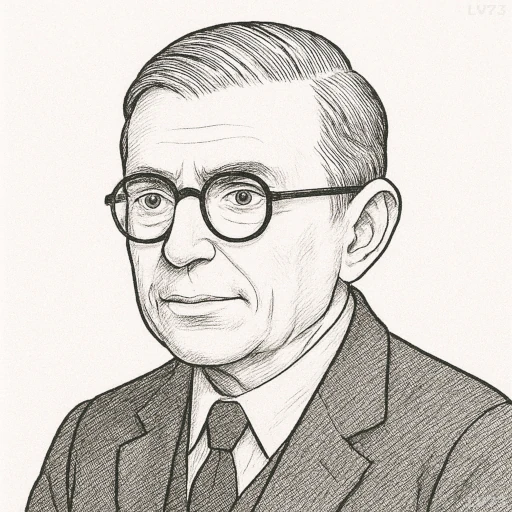“Man is condemned to be free; because once thrown into the world, he is responsible for everything he does.”

- June 21, 1905 – April 15, 1980
- Born in France
- Philosopher, novelist, playwright
table of contents
Quote
“Man is condemned to be free; because once thrown into the world, he is responsible for everything he does.”
Explanation
This statement by Sartre encapsulates a central tenet of his existential philosophy: the idea that freedom is both a gift and a burden. Sartre argues that humans are “condemned to be free,” meaning that, once we are born into the world, we have no choice but to make decisions, and in doing so, we are responsible for everything we choose to do. Unlike other philosophies that posit a preordained purpose or moral guide, Sartre’s existentialism holds that individuals must create their own values and meanings through their choices and actions. This freedom is not a privilege, but a curse because it comes with the weight of responsibility.
The phrase “once thrown into the world” suggests that we have no say in our entry into life; we are thrust into existence without a clear path or predefined role. However, despite this lack of initial control, we are then burdened with the responsibility of defining ourselves. Sartre’s idea that humans are responsible for everything they do emphasizes that no action can be neutral—even indecision or inaction is a choice in itself. This leads to the existential view that authenticity can only be achieved by fully accepting this responsibility and embracing the freedom that comes with it.
In modern life, Sartre’s statement resonates in a world where many feel overwhelmed by the expectations placed on them by society, family, or work. In an era marked by individualism and self-empowerment, people are constantly faced with the pressure of making choices about their identity, career, and values. Sartre’s view challenges the tendency to blame external circumstances for one’s situation, pushing individuals to accept responsibility for their own lives and recognize that their choices, big or small, are what truly shape their existence. This idea remains highly relevant as people navigate modern challenges and seek to live more authentic lives.
Would you like to share your impressions or related stories about this quote in the comments section?
